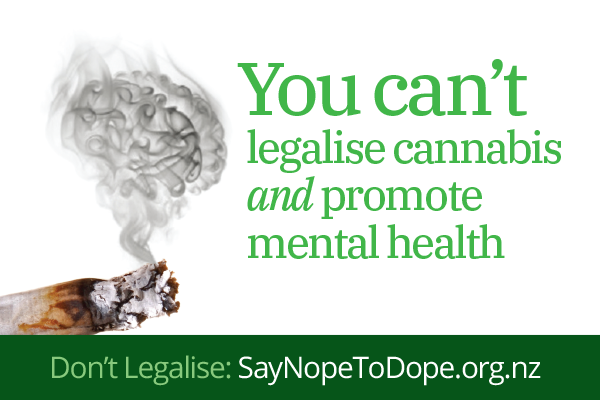Campaign For Nope To Dope Vote Already Making Impact VOTENO.NZ
 The debate around legalising marijuana is already underway and New Zealanders are quickly realising that while there is an appetite for safe and effective forms of cannabis medicine, there is a decreasing appetite for a soft approach to recreational use.
The debate around legalising marijuana is already underway and New Zealanders are quickly realising that while there is an appetite for safe and effective forms of cannabis medicine, there is a decreasing appetite for a soft approach to recreational use.
In the most recent poll, less than 20% (one in five) New Zealanders support legalisation of marijuana, but there is strong support for lifting restrictions for medical use (65%). The polling also found that 85% think that cannabis use can damage the brains of young people under the age of 25, 81% think that drivers using cannabis are more likely to cause accidents, 63% think that cannabis users aged under 25 are less likely to get a job (only 20% think it makes no difference) and half of NZers think that cannabis usage will increase if restrictions are reduced, 35% think usage would remain the same and 6% decrease.
It is clear that Kiwis strongly support a compassionate response to those in real need with a cautious and researched approach around cannabis medicine, but when they thoughtfully consider the real implications of legalising recreational use, they completely reject the proposal – and rightly so.
Evidence shows that marijuana – which has skyrocketed in average potency over the past decades – is addictive and harmful to the human brain, especially when used by adolescents. In US states that have already legalised the drug, there has been an increase in drugged driving crashes, youth marijuana use, and costs that far outweigh tax revenues from marijuana. These states have seen a black market that continues to thrive, sustained marijuana arrest rates, and tobacco company investment in marijuana.
Portugal has seen a rise in the prevalence of alcohol and tobacco consumption and of every illicit psychoactive substance (affected by the weight of cannabis use in those aged 15-74) in the last five years.”
A Canadian federal study just released found a 27% increase in marijuana use among people aged 15 to 24 since legalisation last year. Additionally, approximately 646,000 Canadians have reported trying marijuana for the first time in the last three months, an amount almost double the 327,000 that admitted to trying the drug for the same time period last year. Other concerning trends included 15% of marijuana users got behind the wheel of a car within two hours of using the drug, and daily users were more than twice as likely to believe that it was safe for them to operate a vehicle within three hours of ingesting the drug.
This report comes on the heels of another study finding that the black market in Canada is absolutely thriving, with over 79% of marijuana sales in the last quarter of 2018 occurring outside the legal market – a similar trend to California and Colorado.
When people think about ‘cannabis’, they probably immediately think about the same overused photos by the media of a marijuana plant and a joint being smoked. But legalising marijuana will be far more than that. People will be popping it between classes, sucking on it while driving, drinking it before work, chewing on it while they talk to others, and eating it as a dessert. THC concentrate is mixed into almost any type of food or drink. The potency of edibles (several times that of an average joint) and their attractiveness to kids will lead to serious problems. THC-infused products will include: coffee, ice-cream, baked goods, lolly-pops, fizzy drinks, water bottles, tea, hot cocoa, breath mints & spray, intimate oils, pills, lollies, chewing gum, marinara sauce, baklava, and many more. These new products can be delivered rectally, nasally, vaginally or squirted into the eye to reach the bloodstream faster and deliver a quicker high.
Marijuana is both a law and a public health issue. A smart-arrest policy can both provide a societal stamp of disapproval and provide an opportunity to intervene and stop the progression of use. Keeping marijuana illegal through an appropriate application of the laws that cater for ‘youthful indiscretions’ and which focus on supply and dealers is as much a public safety policy as it is a public health policy.
But at a time when New Zealand’s mental health system is bursting at the seams, why would we legitimise a mind-altering product which will simply add to social harm?






